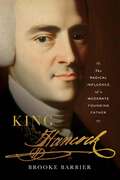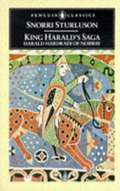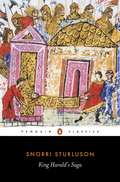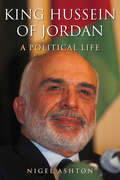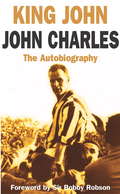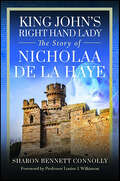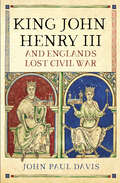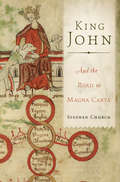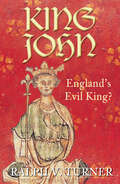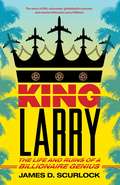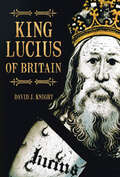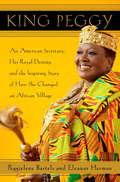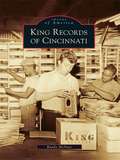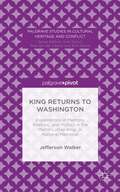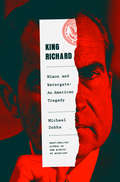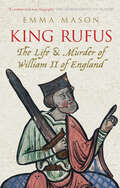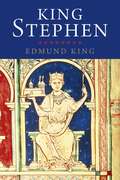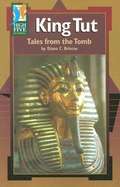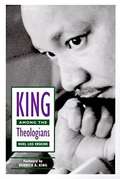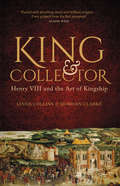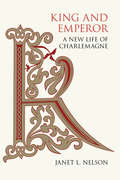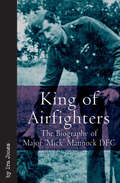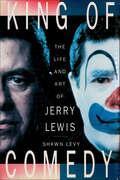- Table View
- List View
King Hancock: The Radical Influence of a Moderate Founding Father
by Brooke BarbierA rollicking portrait of the paradoxical patriot, whose measured pragmatism helped make American independence a reality.Americans are surprisingly more familiar with his famous signature than with the man himself. In this spirited account of John Hancock’s life, Brooke Barbier depicts a patriot of fascinating contradictions—a child of enormous privilege who would nevertheless become a voice of the common folk; a pillar of society uncomfortable with radicalism who yet was crucial to independence. About two-fifths of the American population held neutral or ambivalent views about the Revolution, and Hancock spoke for them and to them, bringing them along.Orphaned young, Hancock was raised by his merchant uncle, whose business and vast wealth he inherited—including household slaves, whom Hancock later freed. By his early thirties, he was one of New England’s most prominent politicians, earning a place on Britain’s most-wanted list and the derisive nickname King Hancock. While he eventually joined the revolution against England, his ever moderate—and moderating—disposition would prove an asset after 1776. Barbier shows Hancock appealing to southerners and northerners, Federalists and Anti-Federalists. He was a famously steadying force as president of the fractious Second Continental Congress. He parlayed with French military officials, strengthening a key alliance with his hospitable diplomacy. As governor of Massachusetts, Hancock convinced its delegates to vote for the federal Constitution and calmed the fallout from the shocking Shays’s Rebellion.An insightful study of leadership in the revolutionary era, King Hancock traces a moment when passion was on the side of compromise and accommodation proved the basis of profound social and political change.
King Harald's Saga
by Magnus Magnusson Hermann PalssonThe story of King Harald (The Ruthless) of Norway, a contemporary of King Harold of England and William The Conqueror of Normandy. Harald attempted to claim for Norway the English throne and succeeded in marching to Chelsea before his army was defeated by English King Harold's troops and Harald was killed. Harold himself was defeated only nineteen days later by William of Normandy. Harald's demise though marked the end of the Viking era, of centuries of Scandinavian harrassment of England. Magnusson and Palsson wrote the introduction and translated the saga into English.
King Harald's Saga
by Snorri SturlusonThis compelling Icelandic history describes the life of King Harald Hardradi, from his battles across Europe and Russia to his final assault on England in 1066, less than three weeks before the invasion of William the Conqueror. It was a battle that led to his death and marked the end of an era in which Europe had been dominated by the threat of Scandinavian forces. Despite England's triumph, it also played a crucial part in fatally weakening the English army immediately prior to the Norman Conquest, changing the course of history. Taken from the Heimskringla - Snorri Sturluson's complete account of Norway from prehistoric times to 1177 - this is a brilliantly human depiction of the turbulent life and savage death of the last great Norse warrior-king.
King Hussein Of Jordan: A Political Life
by Nigel AshtonA towering figure in the history of Jordan, King Hussein reigned for nearly half a century, from his grandfather's assassination in 1953 to his own death in 1999. In this fascinating biography, Nigel Ashton recounts the eventful life of the king who not only survived but flourished amidst crisis after crisis as ruler of a poor desert nation surrounded by powerful and hostile neighbors. Hussein skillfully navigated complicated relationships with the British, his fellow Arab leaders, the new bordering state of Israel, masses of dispossessed Palestinians within his kingdom, every U. S. president from Eisenhower to Clinton, and every British prime minister from Churchill to Blair. This book illuminates the private man, his key relationships, and his achievements and disappointments as a central player in the tough world of Middle Eastern politics. Ashton has had unique access to King Hussein's private papers, including his secret correspondence with U. S. , British, and Israeli leaders, and he has also conducted numerous interviews with members of Hussein's circle and immediate family. The resulting book brings new depth to our understanding of the popular and canny king while also providing new information about the wars of 1967 and 1973, President Reagan's role in the Iran-Contra affair, the evolution of the Middle East peace process, and much more.
King James VI and I and the Reunion of Christendom
by W. B. PattersonThis is a historical study of the career of King James VI and I, as king of Scotland (1567-1625) and England (1603-1625), who achieved a union of the crowns as the first king of Great Britain, and who undertook to end the recurring religious wars. His peacemaking by diplomatic means was complemented by his efforts to foster closer relations among the churches. The peace that he helped to maintain by these initiatives, though cut short by the coming of the Thirty Years' War, was immensely beneficial both to Britain and to the other countries of Europe.
King John
by John CharlesSir Bobby Charlton reckons that if John Charles were playing today, his transfer value would be £70 million; and in a recent poll of Italian football fans, they voted him the greatest foreign player ever to play in their league, ahead of Maradona and Platini. He was equally adept as a centre forward or centre half, and often Juventus would play him up front until he scored, and then move him back into defence to protect the lead.Whether playing for Leeds United, Wales or Juventus, he fully earned his nickname of the 'Gentle Giant', never once being booked or sent off in a 15-year career, and always being the epitome of sportsmanship. KING JOHN recalls not just a vanished era of football, but also highlights what happens to our heroes once they have left the spotlight. It is a warm and moving account from one of football's true legends.
King John
by John CharlesSir Bobby Charlton reckons that if John Charles were playing today, his transfer value would be £70 million; and in a recent poll of Italian football fans, they voted him the greatest foreign player ever to play in their league, ahead of Maradona and Platini. He was equally adept as a centre forward or centre half, and often Juventus would play him up front until he scored, and then move him back into defence to protect the lead.Whether playing for Leeds United, Wales or Juventus, he fully earned his nickname of the 'Gentle Giant', never once being booked or sent off in a 15-year career, and always being the epitome of sportsmanship. KING JOHN recalls not just a vanished era of football, but also highlights what happens to our heroes once they have left the spotlight. It is a warm and moving account from one of football's true legends.
King John's Right Hand Lady: The Story of Nicholaa de la Haye
by Sharon Bennett ConnollyIn a time when men fought and women stayed home, Nicholaa de la Haye held Lincoln Castle against all-comers. Not once, but three times, earning herself the ironic praise that she acted ‘manfully’. Nicholaa gained prominence in the First Baron’s War, the civil war that followed the sealing of Magna Carta in 1215. Although recently widowed, and in her 60s, in 1217 Nicholaa endured a siege that lasted over three months, resisting the English rebel barons and their French allies. The siege ended in the battle known as the Lincoln Fair, when 70-year-old William Marshal, the Greatest Knight in Christendom, spurred on by the chivalrous need to rescue a lady in distress, came to Nicholaa’s aid. Nicholaa de la Haye was a staunch supporter of King John, remaining loyal to the very end, even after most of his knights and barons had deserted him. A truly remarkable lady, Nicholaa was the first woman to be appointed sheriff in her own right. Her strength and tenacity saved England at one of the lowest points in its history. Nicholaa de la Haye is one woman in English history whose story needs to be told…
King John, Henry III and England’s Lost Civil War
by John Paul DavisIn 1204, the great Angevin Empire created by the joining of the dynasties of Henry II of England and his queen, Eleanor of Aquitaine, was fragmenting. At its height, the family landholdings had been among the largest the world had ever seen. From the border of England and Scotland in the north to south of the Pyrenees, it seemed there was nowhere in Europe destined to escape Plantagenet control. Yet within five years of his accession, King John’s grip on the family holdings was loosening. Betrayal against his father and brother, the murder of his nephew, and breaking promises made to his supporters were just some of the accusations levelled against him. When Philip II conquered Normandy, the chroniclers believed that an ancient prophecy was fulfilled: that in this year the sword would be separated from the sceptre. For the first time since 1066, England’s rule over the ancestral land was over. For John, troubles on the continent were just the beginning of a series of challenges that would ultimately define his reign. Difficult relations with the papacy and clergy, coupled with rising dissent among his barons ensured conflict would not be limited to the continent. When John died in 1216, more than half of the country was in the hands of the dauphin of France. Never had the future of the Plantagenet dynasty looked more uncertain. As the following pages will show, throughout the first eighteen years of the reign of Henry III, the future direction of England as a political state, the identity of the ruling family and the fate of Henry II’s lost empire were still matters that could have gone either way. For the advisors of the young king, led by the influential regent, William Marshal, 1st Earl of Pembroke, the effects of John’s reign would be long and severe. Successful implementation of the failed Magna Carta may have ensured his son’s short-term survival, yet living up to such promises created arguably a more significant challenge. This is the story of how the varying actions of two very different kings both threatened and created the English way of life, and ultimately put England on the path to its Lost Civil War.
King John: And the Road to Magna Carta
by Stephen ChurchKing John has long been dubbed one of the "vilest” of English kings. He was brutish, untrustworthy, and ruled as a virtual tyrant--and yet his reign changed the course of English history. As renowned medieval historian Stephen Church argues, John’s importance has for too long been overshadowed by more heroic family members like Richard the Lionhearted and Eleanor of Aquitaine. John was a skilled political manipulator, but his traditional belief in the unchecked power of the sovereign became increasingly unpopular during his reign, leading to frequent confrontations between the king and his barons. In 1215, a group of barons rebelled in response to John’s repressive fiscal policies. The peace treaty that resulted was the Magna Carta, which enshrined the king’s obligation to rule within the framework of the law. King John offers an authoritative portrait of King John and the moment that signaled the end of the age of absolute monarchy and the dawn of constitutional law.
King John: England's Evil King?
by Ralph V TurnerKing John long ago acquired the epithet 'Bad', and he is reputed to be the worst of England's kings. Before his death in 1216, his desperate exploitation of his subjects for ever more money had turned him into the mythical monster of Hollywood legend. In marked contrast to his brother Richard, John appeared incompetent in battle, failing to defend Normandy (1202-04), and was unsuccessful in recovering his lost lands in 1214. A continuing crisis was a constant need for money, forcing John to drain England of funds for campaigns in France, demanding unlawful and oppressive new taxes. Adding to his evil reputation was an ill-tempered personality and a streak of pettiness and spitfulness that led him to monstrous acts, including murdering his own nephew. King John's unpopularity culminated in a final crisis, a revolt by the English baronage, 1215-16, aimed at subjecting him to the rule of law, that resulted in his grant of Magna Carta.
King Larry: The Life and Ruins of a Billionaire Genius
by James D. ScurlockWhen globalization pioneer and reclusive billionaire Larry Hillblom disappeared in 1995, he left behind an international fiasco that is still unraveling today. King Larry is a three-part journey, beginning with the early years of a mercurial young man who grew up fatherless on a peach farm outside of Fresno, California. Months after graduating from Boalt Hall School of Law in 1969, Hillblom cofounded DHL--three years before FedEx was formed--and it quickly became the fastest-growing corporation in history. Hillblom's expatriate life began twelve years later, when he retreated to a small tax haven in the Western Pacific. There, James Scurlock reveals, Hillblom led the resistance to American meddling in the Mariana Islands, rewrote the tax code and real-estate laws, and became a Supreme Court justice--among other unlikely exploits. Hillblom's voracious appetite for underage prostitutes is another facet of his convoluted story, illuminating the realities of the sex and human-trafficking industries in Southeast Asia. But Hillblom's amoral, thrill-seeking nature finally caught up with him when his vintage seaplane disappeared off the coast of Anatahan in May 1995, and he left behind an estate worth close to a billion dollars. Weeks later, five impoverished women and their attorneys came forward to challenge Hillblom's will, his former business partners, and his alma mater, provoking a legal battle that has raged for over fifteen years. From Howard Hughes to Mark Zuckerberg, the public has always been fascinated by larger-than-life entrepreneurs and their eccentricities. Now, James Scurlock engages us with the riveting story of one such man, who dressed in rags and lived in relative obscurity, but who has had a profound and lasting influence--a pioneer who shrank the globe, toppled the postal monopoly, anticipated electronic mail, and, most important, envisioned a world driven by economics rather than by laws.
King Lucius of Britain
by David J KnightWhile everyone knows the story of King Arthur, few will have heard of King Lucius, a figure who has been consigned to myth and largely forgotten in the annals of British history. Examining the primary sources as well as the archaeological evidence for this second century king, David Knight convincingly refutes the generally accepted view expounded at the beginning of the twentieth century that identifies Lucius as King Abgarus of Edessa. King Lucius of Britain reconstructs the story of this fascinating figure, who applied to the Pope for formal baptism in AD 177, making him the first Christian King in Britain, and traces the history of the story of Lucius, separating the myth from reality and attempting to restore this King to his rightful place in British history.
King Peggy: An American Secretary, Her Royal Destiny, and the Inspiring Story of How She Changed an African Village
by Eleanor Herman Peggielene Bartels<P>The charming real-life fairy tale of an American secretary who discovers she has been chosen king of an impoverished fishing village on the west coast of Africa. <P> King Peggy has the sweetness and quirkiness of The No. 1 Ladies' Detective Agency series and the hopeful sense of possibility of Half the Sky. <P>King Peggy chronicles the astonishing journey of an American secretary who suddenly finds herself king to a town of 7,000 souls on Ghana's central coast, half a world away. Upon arriving for her crowning ceremony in beautiful Otuam, she discovers the dire reality: there's no running water, no doctor, and no high school, and many of the village elders are stealing the town's funds. <P>To make matters worse, her uncle (the late king) sits in a morgue awaiting a proper funeral in the royal palace, which is in ruins. The longer she waits to bury him, the more she risks incurring the wrath of her ancestors. Peggy's first two years as king of Otuam unfold in a way that is stranger than fiction. <P> In the end, a deeply traditional African town has been uplifted by the ambitions of its headstrong, decidedly modern female king. And in changing Otuam, Peggy is herself transformed, from an ordinary secretary to the heart and hope of her community. <P><b>A New York Times Bestseller</b>
King Records of Cincinnati
by Randy McnuttStarting with a few songs and a dream in 1943, King Records--a leading American independent--launched musical careers from a shabby brick factory on Brewster Avenue in Cincinnati's Evanston neighborhood. Founder Sydney Nathan recorded country singers Cowboy Copas, Hawkshaw Hawkins, Wayne Raney, and others and later added black acts such as James Brown and the Famous Flames, Bull Moose Jackson, Hank Ballard and the Midnighters, Lonnie Johnson, and Freddy King. Meanwhile, King also explored polka, jazz, bluegrass, comedy, gospel, pop, and instrumental music--anything that Nathan could sell. Although King's Cincinnati factory closed in 1971, the company's diverse catalog of roots music had already become a phenomenon. Its legacy lives on in hundreds of classic recordings that are prized by collectors and musicians.
King Returns to Washington: Explorations Of Memory, Rhetoric, And Politics In The Martin Luther King, Jr. National Memorial (Palgrave Studies in Cultural Heritage and Conflict)
by Jefferson WalkerExploring the Dr. Martin Luther King, Jr. National Memorial (King Memorial) in Washington, DC through a multi-faceted rhetorical analysis of the site's visual and textual components, Jefferson Walker reveals multiple critical, popular, privileged, and vernacular interpretations of the site and Dr. Martin Luther King's memory. Walker argues that the King Memorial and its related texts help to universalize and institutionalize King's ethos - creating a contentious rhetorical battleground where various people and organizations contest the "ownership" and use of King's memory. Walker uses these analyses to uncover how the site contributes to the public memory of Dr. Martin Luther King, Jr.
King Richard: Nixon and Watergate--An American Tragedy
by Michael Dobbs"Rich and kaleidoscopic… Dobbs has carved out something intimate and extraordinary, skillfully chiseling out the details to bring the story to lurid life."—Jennifer Szalai, New York Times From the best-selling author of One Minute to Midnight: a riveting account of the crucial days, hours, and moments when the Watergate conspiracy consumed, and ultimately toppled, a president.In January 1973, Richard Nixon had just been inaugurated after winning re-election in a historic landslide. He enjoyed an almost 70 percent approval rating. But by April 1973, his presidency had fallen apart as the Watergate scandal metastasized into what White House counsel John Dean called &“a full-blown cancer.&” King Richard is the intimate, utterly absorbing narrative of the tension-packed hundred days when the Watergate conspiracy unraveled as the burglars and their handlers turned on one another, exposing the crimes of a vengeful president.Drawing on thousands of hours of newly-released taped recordings, Michael Dobbs takes us into the heart of the conspiracy, recreating these traumatic events in cinematic detail. He captures the growing paranoia of the principal players and their desperate attempts to deflect blame as the noose tightens around them. We eavesdrop on Nixon plotting with his aides, raging at his enemies, while also finding time for affectionate moments with his family. The result is an unprecedentedly vivid, close-up portrait of a president facing his greatest crisis.Central to the spellbinding drama is the tortured personality of Nixon himself, a man whose strengths, particularly his determination to win at all costs, become his fatal flaws. Rising from poverty to become the most powerful man in the world, he commits terrible errors of judgment that lead to his public disgrace. He makes himself—and then destroys himself.Structured like a classical tragedy with a uniquely American twist, King Richard is an epic, deeply human story of ambition, power, and betrayal.
King Rufus: The Life and Murder of William II of England
by Emma MasonThe future William II was born in the late 1050s the third son of William the Conqueror. The younger William, - nicknamed Rufus because of his ruddy cheeks - at first had no great expectations of succeeding to the throne. This biography tells the story of William Rufus, King of England from 1087-1100 and reveals the truth behind his death.
King Stephen
by Edmund KingThis compelling new biography provides the most authoritative picture yet of King Stephen, whose reign (1135-1154), with its "nineteen long winters" of civil war, made his name synonymous with failed leadership. After years of work on the sources, Edmund King shows with rare clarity the strengths and weaknesses of the monarch. Keeping Stephen at the forefront of his account, the author also chronicles the activities of key family members and associates whose loyal support sustained Stephen's kingship. In 1135 the popular Stephen was elected king against the claims of the empress Matilda and her sons. But by 1153, Stephen had lost control over Normandy and other important regions, England had lost prestige, and the weakened king was forced to cede his family's right to succession. A rich narrative covering the drama of a tumultuous reign, this book focuses well-deserved attention on a king who lost control of his destiny.
King Tut: Tales From the Tomb
by Diana C. BriscoeReaders of all ability levels will want to read these high-low books from 5 high-interest nonfiction subject areas: sports, history, biography, adventure, and science. Each easy-to-read book explores a fascinating narrative account of the subject. This all-new series features historical photographs, full-color graphics, glossary words on each page, and a contemporary chapter-book format. Copyright © Libri GmbH. All rights reserved.
King among the Theologians
by Noel Leo ErskineHe skillfully explains how King was nourished by, and helped to nourish, these teeming theological crosscurrents. Erskine proposes that womanist theology provides an insightful critique of King's thought and helps supply a critical missing element in King's vision - the explicit acknowledgment of the rightful place of women in the Beloved Community.
King and Collector: Henry VIII and the Art of Kingship
by Siobhan Clarke Linda CollinsNo English king is as well-known to us as Henry VIII: famous for six marriages; for dissolving the monasteries; and for the ruthless destruction of those who stood in his way. But Henry was also an ardent patron of the arts whose tapestries and paintings, purchased in pursuit of glory and magnificence, adorned his lavish court and began the Royal Collection. In contrast to later royal collectors, this king was more interested in storytelling than art for its own sake, and all his commissions relate to one central tale: the glorification of Henry and his realm. His life can be seen through his art collection and the works tell us much about both his kingship and his insecurities. King and Collector tells a unique story of art, power and propaganda in Tudor England.
King and Emperor: A New Life of Charlemagne
by Janet L. Nelson"King and Emperor takes on the compelling suspense of good detective work as well as good history."—The Wall Street Journal Charles I, often known as Charlemagne, is one of the most extraordinary figures ever to rule an empire. Driven by unremitting physical energy and intellectual curiosity, he was a man of many parts, a warlord and conqueror, a judge who promised "for each their law and justice," a defender of the Latin Church, a man of flesh and blood. In the twelve centuries since his death, warfare, accident, vermin, and the elements have destroyed much of the writing on his rule, but a remarkable amount has survived. Janet Nelson's wonderful new book brings together everything we know about Charles I, sifting through the available evidence, literary and material, to paint a vivid portrait of the man and his motives. Building on Nelson’s own extraordinary knowledge, this biography is a sort of detective story, prying into and interpreting fascinating and often obdurate scraps of evidence, from prayer books to skeletons, gossip to artwork. Charles’s legacy lies in his deeds and their continuing resonance, as he shaped counties, countries, and continents; founded and rebuilt towns and monasteries; and consciously set himself up not just as King of the Franks, but as the head of the renewed Roman Empire. His successors—even to the present day—have struggled to interpret, misinterpret, copy, or subvert his legacy. Janet Nelson gets us as close as we can hope to come to the real figure of Charles the man as he was understood in his own time.
King of Airfighters: The Biography of Major 'Mick' Mannock DFC (Vintage Aviation Library)
by Ira JonesA penetrating study of Britain’s top World War I fighter ace, written by fellow pilot Ira Jones, the author of An Air Fighter’s Scrapbook.Ira Jones’ biography of Britain’s top-scoring ace of the First World War has become the subject of some controversy over the last few years; most notably, it claims seventy-three “kills” for Mannock, making him the number-one-scoring Allied ace of the war. Later research has thrown serious doubt on this assertion, and indeed, Mannock himself only claimed fifty-one kills.Jones’ biography is nevertheless an important account, especially when seen in the context of the time in which it was first written. In particular, the biography delves into the mind of Mannock, portraying the singular nature of his character and the true stress that these pioneer air fighters experienced in the last few months of the war.Originally published in 1934 by Ivor Nicholson and Watson in London, the book has been reprinted—most recently in the 1990s by Greenhill Books as part of its Vintage Aviation Library—and reproduced from the original 1930s version of the book.Not a word has been changed in this Casemate edition, but the original, very dated type and page layout have been reworked, as has been the format in which the book is presented, to give a beautiful new treatment to this classic of aviation literature.
King of Comedy: The Life and Art of Jerry Lewis
by Shawn LevyShawn Levy's fascinating biography King of Comedy - the product of vast research and interviews with contemporaries, admirers, foes, and even, briefly, Lewis himself - traces the story of a man who defines High American Show Biz. At points along the time line of his career, Lewis has been the highest-paid performer in history in film, on television, and (in 1995!) on Broadway. With partner Dean Martin, he was half of the most successful comedy duo of all time. He was the first director who debuted in talkies to direct himself. He was a direct, acknowledged influence on giants from Woody Allen to Lenny Bruce to David Letterman to Jim Carrey. He is a Chevalier of the French Legion of Honor, has raised over $1 billion in charity, and was once nominated for a Nobel Peace Prize. And, since the 1950s, he has been one of the most recognized faces on earth. For almost that long, though, people have argued over what Jerry Lewis means. Is he a talented comedian or a grotesque mimic? A startlingly original director or a pretender to Chaplin's throne? A multifaceted entertainer or a megalomaniacal egoist? A tireless champion of the disabled or a tireless self-promoter who has confused America's charitable impulses with affection for him as a performer?
